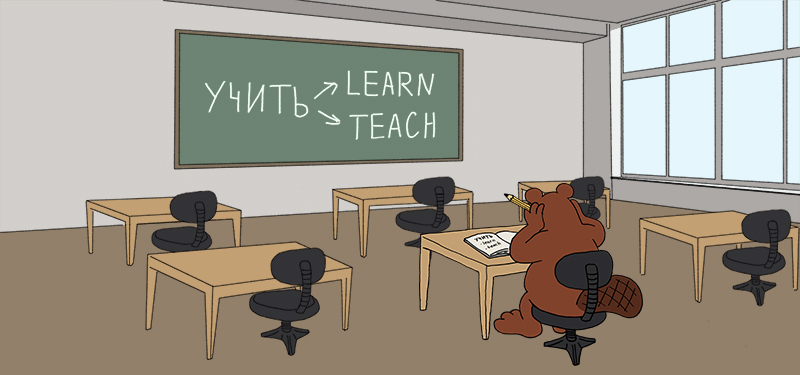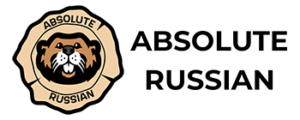Учить: 'to teach' vs. 'to learn'

This guide aims to put an end to the havoc wreaked by учи́ть(ся) (a verb that means both ‘to learn’ and ‘to teach’).
Here you will find:
- A table breaking down various meanings and grammar
- Detailed explanations of each construction
- A practical exercise with real-life examples and in-depth analyses of the whys and hows
BREAKDOWN
TO LEARN
Учить/выучить +
• noun in Accusative
E.g.: учить географию, выучить слова (to learn geography, to learn words)
Учиться/научиться +
• noun in Dative
• infinitive verb
E.g.: учиться плаванию, научиться петь (to learn swimming, to learn to sing)
TO TEACH
Учить/научить +
• noun in Dative
• infinitive verb
E.g.: учить географии, научить петь (to teach geography, to teach to sing)
The colours are there to exhibit that there are only two ways учить(ся) can be followed:
- noun in Accusative
- noun in Dative / infinitive verb
EXPLANATIONS
TO LEARN
Учить/выучить + noun in Accusative
The construction relates to knowledge, like geography, a poem or dance moves.
Учить физику, русский язык, географию, биологию, песню
To learn physics, the Russian language, geography, biology, a song
Note that the perfective выучить is less versatile because of its perfective nature: it carries the sense of successfully finishing learning something, mastering in other words. While it works with languages (e.g. выучить русский язык) it doesn’t quite work with expansive subjects such as geography or biology (since you can’t really finish learning physics, for example). Выучить works best with smaller things like lessons or songs.
Выучить урок, стих, теорему, слова
To learn a lesson, poem, theory, words
Учиться/научиться + noun in Dative or infinitive verb
This construction relates to skill.
• Учиться плавать/плаванию, играть на гитаре/игре на гитаре
To learn to swim/swimming, play the guitar/the guitar
• Научиться быть терпеливым/терпению
To learn to be patient/patience
Following учиться with an infinitive verb is more common than with a noun in Dative.
TO TEACH
Учить/научить + noun in Dative or infinitive verb
A versatile construction that can be used in a wide variety of contexts with either a noun or an infinitive verb.
• Учить физике, музыке, хорошим манерам
To teach physics, music, good manners
• Учить плавать, играть на пианино, кататься на коньках
To teach to swim, play the piano, ice skate
Keep in mind that because научить is perfective, it won’t quite work, logically, with massive subjects that have no boundaries, like physics for example, since that would mean making someone master something. For instance, saying научить физике sounds a bit odd (just like ‘to teach the whole of physics’ sounds like a bit of a stretch), but saying научить основам физики (‘to make someone master the basics of physics’) makes sense, because it’s about a finite amount of knowledge.
EXERCISE
Think of how you would say the phrases below in Russian and check against the originals by clicking on the sentences below. Each example comes with an analysis of why that is and what other options are possible.
Учиться is used here because this is about skill. The imperfective implies that the author did not necessarily master surfing. Научиться (perfective), on the other hand, would mean that the author did master surfing. A noun in Dative (я училась/научилась сёрфингу) is technically possible but doesn’t really flow: verbs are usually preferred in this construction.
The other construction meaning ‘to learn’ — учить/выучить + noun in Accusative — won’t work here because surfing is primarily about skill rather than pure knowledge (which учить/выучить is used for).
A song is about knowledge rather than skill (as opposed to singing), hence выучить (as opposed to научиться).
The perfective выучить is here because this is about a result of having the song fully in your memory. The imperfective учить would sound odd in this construction with song in the singular: something like ‘how to be learning a song’ with no stress on the result of successfully learning said song. It could be used with ‘songs’ in the plural, however, with a general sense of how to learn songs (как учить песни): an article with that title would perhaps focus on certain learning techniques, etc.
Yes, you read it right, life hacks, laifkhaki… Make sure to check out other pieces of Runglish on our Instagram page. You’ll find one of our Runglish posts at the end of this article.
Back to the example. Научиться is used here because dancing is about skill; учить/выучить won’t work for that reason (they are about knowledge). The imperfective учиться is possible, but isn’t quite logical here because the context is about acquiring a skill (the result is conveyed by the perfective) rather than just learning a skill without a result necessarily.
A noun in Dative isn’t an option here because there is no noun specifically for dancing in Russian, only dance/dances (танец/танцы).
This is учить followed by a noun in Dative. A verb is also possible, in which case it would be ‘динозавры учат играть в шахматы’. Both cases involve an imperfective (учить).
The perfective is also possible with both a noun and a verb — ‘динозавры научат шахматам/играть в шахматы; however, using the perfective научить in its conjugated form (научат) will change the tense to the future. The reason is that perfective in Russian does not exist in the present (either future or past).
This is научиться + noun in Dative. The other ‘to learn’ pair, учить/выучить, won’t work as it is about knowledge, while here we’re talking about skill.
The perfective научиться is preferred over the imperfective (учиться) because this is about acquiring a skill, not just learning it in vain. Finally, научиться + infinitive verb, which is a legitimate construction we saw in example 3 (‘How to learn to dance from scratch’), isn’t used here simply because the word ‘manners’ isn’t really used with a verb like that (you learn manners, not showing/presenting/etc them).
Учить is used as opposed to учиться/научиться because this example is about knowledge rather than skill. Учить in the sense of learning can only be used with a noun in Accusative, so we don’t really have any other options here.
The imperfective учить is used rather than the perfective выучить because the idea here is general: poems that are generally interesting to learn.
For teaching, we’ve got two options учить (imperfective) and научить (perfective). Here the perfective is preferred because we want to stress the result of a dog being able to perform tricks, in other words how to get to a point where a dog does tricks.
Using the imperfective учить on the other hand, would stress the process of teaching — perhaps a breakdown of different teaching techniques, etc. — it wouldn’t be about the result of the dog acquiring trick-performance skills.
Учить/научить can alternatively be used with a verb (the current example is with the Dative case): как научить собаку делать трюки (how to teach a dog to perform tricks).
This example is very similar to the previous one with the only difference being that this one features a verb. Научить рисованию, with Dative, (to teach drawing/painting) is passable but doesn’t flow too well; this is because рисование in Russian means the actual field of drawing/painting, which is too big to fully master. Научить основам рисования (to teach the basics of drawing) on the other hand, works.
Учиться + dative is the construction here. The phrase could work with a verb too: учиться быть вежливым (to learn to be polite).
Using the perfective научиться with either a verb or a noun in Dative would change the tense because there is no perfective in the present tense in Russian.
The other pair meaning to learn, учить/выучить, won’t work here because patience is a skill, while учить/выучить relates to knowledge.
BONUS
Изучать/изучить (imperfective/perfective) — these two are geared toward ‘studying’ or ‘analyzing’ and only work with nouns.
• Изучать русский язык
To learn/study the Russian language
• Изучить материалы
To analyse/study materials
There is also another way of saying to teach that isn’t about учить — преподавать + noun in Accusative. However, it is specific to teaching as a job.
Преподавать английский/географию/историю
To teach English/geography/history
It can also be used without an object.
Преподавать в университете
To teach at a university
Perfective is possible (преподать), but is used in the phrase преподать урок, meaning to teach someone a lesson (as in to show someone where they have been or could be wrong).
Finally, there is another way учиться, which we looked at in the main part of our article, can be used, namely, intransitively (without a direct object) in sentences about where you’re studying.
Лена учится в педагогическом университете.
Lena is studying at a teacher training university.
Lastly, here is an Instagram post with some Runglish, as promised in the exercise section.











